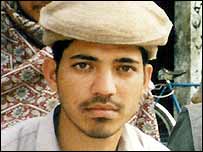PAKISTAN: Death penalty; unfair trial; violation of the right to life
 international |
rights, freedoms and repression |
opinion/analysis
international |
rights, freedoms and repression |
opinion/analysis  Thursday October 12, 2006 15:35
Thursday October 12, 2006 15:35 by Qasim Rajpar
by Qasim Rajpar
Mr. Mirza Tahir Hussain (aged 38), who is facing imminent execution scheduled for early November after Ramadan, the fasting month for Muslims. He, who was 18 years old at that time, had been charged with murder in 1988, but was acquitted of all charges against him by the Lahore High Court in 1996.
Mr. Mirza Tahir Hussain (aged 38), who is facing imminent execution scheduled for early November after Ramadan, the fasting month for Muslims. He, who was 18 years old at that time, had been charged with murder in 1988, but was acquitted of all charges against him by the Lahore High Court in 1996. However, the Federal Shariat Court suddenly claimed its jurisdiction over the case under Islamic law, overturned high court judgment and sentenced him to death in 1998. The Supreme Court upheld the judgment of the Shariat Court in 2003 and dismissed Mr. Hussain's appeal in 2004. Only an act of clemency by the President can save Mr. Mirza Tahir Hussain's life.
In 1988, Mr. Mirza Tahir Hussain, a Pakistani born British national who was 18 years old at that time, came to Pakistan from London to see his native place. He was tried and convicted of murdering a taxi driver while traveling to the village of Bhubar from Rawalpindi, Punjab Province on 17 December 1988. The taxi driver reportedly stopped the car and produced a gun, and Mr. Mirza Tahir Hussain, was reportedly physically and sexually assaulted by the taxi driver. In the scuffle that followed, the gun went off, and the taxi driver was fatally injured.
Mr. Mirza Tahir Hussain was sentenced to death in 1989 by the Sessions Court in Islamabad. The case was returned to the Sessions Court where Mr. Mirza Tahir Hussain was sentenced to life imprisonment in 1994. Following a second appeal, the Lahore High Court then dismissed this sentence in 1996 for lack of evidence, and Mr. Mirza Tahir Hussain was acquitted of all charges against him.
While Mr. Mirza Tahir Hussain was waiting for his release from prison, one week after the high court the case was referred to the Federal Shariat Court, which announced the case under its jurisdiction based on the fact that charges from the original case, including robbery involving murder fell under Islamic offences against property law. According to the Constitution of Pakistan, the duties of Federal Shariat Court's duties are to review the laws of the country to ensure that they are in conformity with Islamic Doctrine and to deal with appeals of cases tried under Islamic Laws. However, the Constitution does not mention that the Federal Sharia Court can reopen the case which was completed by the secular courts. Interestingly, the Federal Sharia Court never claimed its jurisdiction on this case while it was being tried in the secular Session Courts in Islamabad and the High Courts from 1988 to 1996, until the High Court acquitted him.
The entire case against Mr. Mirza Tahir Hussain was reopened, and in 1998, he was sentenced to death by the Federal Shariat Court, despite their acknowledgment that no robbery had taken place due to the taxi being hired. In the case of Mr. Mirza Tahir Hussain, there was neither eye witness nor the accused of the alleged robbery case during entire court proceedings. According to the Islamic law, the death penalty is imposed only if "reliable eyewitness" accounts or a "confession" to the court are submitted.
However, Supreme Court upheld the judgment of the Federal Shariat Court in 2003 and dismissed Mr. Mirza Tahir Hussain's appeal in 2004. A petition for clemency was sent to the President in 2005 but was declined. Meanwhile, the killed taxi driver's family refused compensation offered Mr. Mirza Tahir Hussain's family, which could allow Mr. Mirza Tahir Hussain to be pardoned under the Islamic law.
Mr. Mirza Tahir Hussain's case is a typical case of dual judicial system of Pakistan, the Islamic courts and secular courts. The secular courts are coming under the Supreme Court of Pakistan, while the Federal Shariat court is coming under Supreme Court. At provincial level, Shariat courts come under the provincial high courts.
Several local and international human rights groups including Amnesty International, the members of European parliament and the members of Parliament of United Kingdom have appealed to the President of Pakistan to pardon Mr. Mirza Tahir Hussain as he did not receive a Fair trial due to the contradictory statements of the different Courts and lack of evidence. Mr. Mirza Tahir Hussain, who is now 38 Years, has been detained for 18 years and is awaiting execution in the notorious Adiala Jail in Rawalpindi, Pakistan.
The second petition for clemency for Mr. Mirza Tahir Hussain has been pending with the President's office since 2005. His execution was scheduled for 1 October 2006 but the President deferred it for one month, which means early November, due to the holy month of Ramadan in October. This was the fifth time that the President deferred Mr. Mirza Tahir Hussain's execution awarded by the Federal Shariat Court.

Comments (1 of 1)
Jump To Comment: 1http://www.amnesty.org : 'Death Penalty A Failure of Justice.'
There are some backround details and the piece above.
Indymedia Ireland is a media collective. We are independent volunteer citizen journalists producing and distributing the authentic voices of the people. Indymedia Ireland is an open news project where anyone can post their own news, comment, videos or photos about Ireland or related matters.